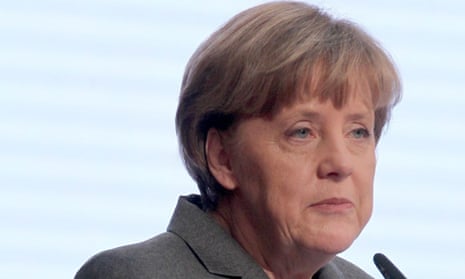Downing Street and the German chancellery are embroiled in a worsening dispute over intelligence-sharing and the covert counter-terrorism campaign because of conflicts arising from the surveillance scandals surrounding the US National Security Agency and Britain’s GCHQ.
According to German newspaper reports citing government and intelligence officials in Berlin, the Bundestag’s inquiry into the NSA controversy is being jeopardised by Britain’s refusal to cooperate and its threats to break off all intelligence-sharing with Berlin should the committee reveal any UK secrets.
The weekly magazine Focus reported last month that a national security aide to David Cameron had written to Peter Altmaier, Angela Merkel’s chief of staff, refusing all requests for help in the inquiry and warning that Britain would cease supplying terrorism-related intelligence to the Germans unless Berlin yielded.
It emerged during the NSA revelations that the Americans had hacked into Merkel’s mobile phone, generating outrage in Germany and feeding growing anti-American sentiment.
Internationally, the BND, Germany’s foreign intelligence service, is viewed as less than vigorous. In the secret war on terror, the Germans are said to be dependent on signals intelligence from the British and the Americans.
Gerhard Schindler, head of the BND, was recalled from holiday and has briefed senior government officials and parliamentary leaders on what Munich’s Süddeutsche Zeitung termed on Tuesday a burgeoning crisis.
“The British possibly want to cover up that they are spying on Germany, not only on countering terror,” the newspaper said. “[Merkel’s] chancellery is baffled as to why the British are being so stubborn … Why are the British so set on escalation?
“It’s particularly hot for the British because often it’s about straightforward spying, as well as terrorism hunting. This would definitely be against the European spirit on the continent, perhaps a breach of the European treaties.”
The letter from Downing Street to Berlin was sent at the end of January and triggered a row in Germany when it was leaked to the press. Schindler and aides to Merkel tried to talk MPs on the committee into censoring disclosures about UK activity. That displeased committee members even from the government ranks, and two Greens MPs are threatening to take the issue to Germany’s supreme court in Karlsruhe.
Information already available to the committee from German sources is said to reveal operational details of UK activities, encryption methods, codes and decoding techniques.
“The British are horrified that these things could become public via the committee,” a source, said to be a senior German government official, told Focus. An intelligence official was quoted as saying: “We would be blind without the signals intelligence from the Americans and the British. Virtually all important tips on countering terror in this country have come from the Anglo-American services.”
The Americans are said to be deciding on a case-by-case basis whether to collaborate with the German inquiry and whether to supply requested materials, while the British simply say no to all requests, the Süddeutsche reported, citing committee sources.
“We can’t just exclude Great Britain,” Patrick Sensburg, the Christian Democrat MP chairing the committee, told the newspaper. “Then the Americans will write a similar letter tomorrow and we will have to give up.”
Drawing on government sources, the newspaper said: “The federal government sees the cable from London as an unconcealed threat. Since the threatening letter arrived, it’s been one crisis meeting after another in the chancellery.”
